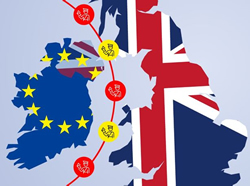Colin Chapman* says the relationship between Northern Ireland and the rest of the United Kingdom has always been a complex one. Now with the future of the Northern Ireland Protocol in doubt, tensions are mounting.
 Situated just north of the line separating Northern Ireland from the Irish Republic, the ancient market town of Newry and its 30,000 residents have been a beneficiary of the Good Friday Agreement that brought an end to 30 years of conflict.
Situated just north of the line separating Northern Ireland from the Irish Republic, the ancient market town of Newry and its 30,000 residents have been a beneficiary of the Good Friday Agreement that brought an end to 30 years of conflict.
At the height of what is known as the Troubles in the late 1970s, the unemployment rate in Newry was around 30 per cent; today it is just two per cent.
During the Troubles, Newry was a dangerous place with 53 people recorded as having been fatally shot or blown up in bomb attacks.
Now the deal that brought peace and prosperity to Ireland is under threat.
What were the Troubles? The conflict was between the overwhelmingly Protestant unionists — they preferred to be known as loyalists — who desired the Province to remain part of the United Kingdom, and the predominantly Catholic nationalists who wanted Northern Ireland to become part of the Republic to the south.
As the bitterness between the two sides grew, the British army was sent in. The conflict further deteriorated as the Irish Republican Army (IRA), a paramilitary force, entered the fray.
The IRA targeted British soldiers and Protestant loyalists, whereas loyalist paramilitaries sought out Catholics, including priests with strong links to Sinn Fein, the active political wing of the Republican movement.
The conflict finally petered out in 1998 with the signing of the Good Friday Agreement, after two years of talks brokered by the United States and the European Union.
A copy was sent to every household in Northern Ireland and the Republic. A month later the people of both countries agreed via a referendum to support a deal which provided for power-sharing between the nationalist and republican communities in Northern Ireland.
A new National Assembly, given devolved powers by London, was created.
However, old antagonisms remained, and the Assembly has been suspended periodically, with one period seeing power reversed to London and Westminster’s Northern Ireland Minister.
The current problem is, of course, Brexit — the referendum, where the British voted narrowly to end UK membership of the EU, although the Northern Irish joined the Scots in choosing to remain.
Brexit campaigner, Boris Johnson, who later became the British Prime Minister, and desperate to “get Brexit done”, created what has become known as the Northern Ireland Protocol.
This formed an essential part of the free trade agreement he negotiated between Britain and the EU and is designed to govern special arrangements for Northern Ireland.
Because the trade deal gives Northern Ireland access to the lucrative European Union single market, it provides for customs checks on goods moving to and from Northern Ireland to the rest of the United Kingdom.
This has infuriated the pro-union Democratic Unionist Party (DUP) which has demanded the removal of the protocol.
Northern Ireland now finds itself in crisis, because at recent elections, where the republican Sinn Fein party received the largest number of votes, the DUP has refused to re-join the power-sharing administration until the protocol is removed.
Johnson, who originally denied that the clauses would lead to customs checks being imposed on goods crossing the Irish Sea, has twice promised to remove them, but has not done so.
However, Foreign Secretary, Liz Truss has threatened to introduce such legislation “within weeks” but said she would prefer to agree to suitable amendments with the EU.
The EU response was swift and brisk. Vice President of the EU Commission, Maros Setcovic said unilateral actions by Britain were unacceptable.
If the UK went ahead with a Bill the EU “would need to respond with all measures at its disposal”.
Though he did not provide specifics, the Brussels-based Commission has considerable weaponry in its armoury, and could go as far as tearing up the EU-UK Trade and Cooperation Agreement, which would devastate the UK economy.
Even selective measures could cause considerable harm, such as imposing extra customs checks on goods arriving on vehicles being driven through the Channel Tunnel.
It is not as if Johnson had not been repeatedly warned of the consequences of Brexit on the Good Friday Agreement.
Johnson’s position is further complicated by United States President, Joe Biden repeatedly voicing objections to his plan from across the Atlantic.
Biden has told Johnson several times that he must not tear up the protocol, with the White House Press Secretary insisting the best way forward is “a pragmatic one that requires courage, cooperation and leadership”.
UK Opposition Leader, Sir Keir Starmer has called the Prime Minister’s plans “deeply concerning.”
His view was backed by Nancy Pelosi, Speaker of the US House of Representatives who said the Good Friday Accords were the bedrock of peace in Northern Ireland and “a beacon for the whole world”.
In Newry, they hope for a settlement, while representatives of Northern Ireland business dispute claims made by Johnson and the DUP that problems on the border with the UK are damaging the Northern Ireland economy.
Head of Manufacturing Northern Ireland, Stephen Kelly, claims that three quarters of his members have benefited from the protocol and continued membership of the European single market.
It is starting to look as if Johnson has picked the wrong issue on which to have his latest fight with the EU.
*Colin Chapman is editor-at-large of Australian Outlook and a fellow of the Australian Institute of International Affairs. He is a writer, broadcaster, and public speaker who specialises in geopolitics, international economics, and global media issues.
A fuller form of this article first appeared on the website of the Australian Institute of International Affairs.




